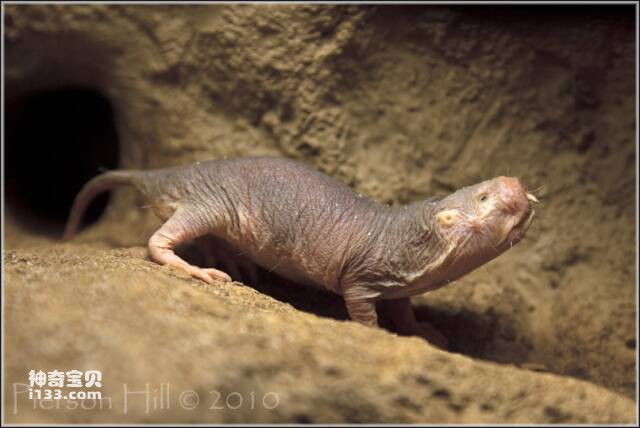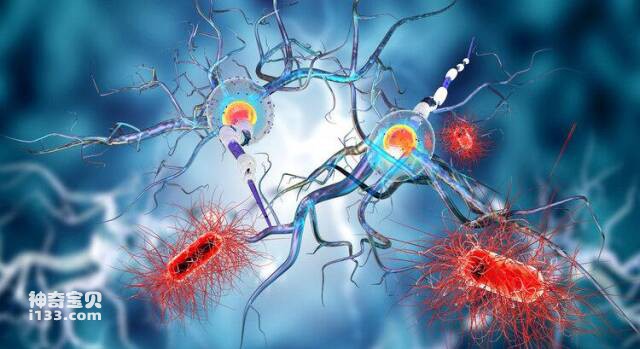According to data from the World Health Organization, cancer is the second leading cause of death in the world, affecting millions of people of all ages around the world. Many people have questions: While the human world is engaged in a life-and-death struggle with cancer, will cancer exist in the animal world? Can animals get cancer?
The answer is, yes!
my country's cancer research department once conducted a tumor survey on farmed animals. It was found that out of 269 domestic chickens, 11 domestic chickens suffered from different types of cancer, including liver cancer, gastric cancer, etc., mainly digestive system cancer.
In addition, Australian scientists have discovered skin cancer in wild trout on the Great Barrier Reef, and esophageal cancer in cattle and sheep on farms. Various surveys and studies have shown that animals are likely to suffer from cancer, whether in the natural environment or in a breeding environment.

Naked Mole Rat丨Source: Pierson Hill
1. Carnivores have a higher risk of cancer
After investigation, scientists found that the risk of death from cancer in mammals can be as high as 57%, and there are 41 species of mammals with a death risk exceeding 10%. Compared with mammals with different feeding habits, carnivores are more susceptible to cancer, especially animals at the top of the food chain, such as foxes, leopards, and wolves, with more than 25% of samples dying from cancer.
Researchers at the University of Southern Denmark speculate that both cats and large dogs are susceptible to cancer, possibly due to the lower microbial diversity of carnivores and the limited physical exercise some carnivores receive under human care.
Subsequent research by Beata Ujvari of Deakin University in Australia added another reason why carnivores are more susceptible to cancer - the diet of carnivores is high in fat and low in fiber, which results in a lower diversity of intestinal bacteria than that of plants. feeding animals, which has similarities to human cancer risk factors.
One of the species most susceptible to cancer is the bristle-tailed quoll, a small carnivorous marsupial living in Australia. The team conducted autopsies on 28 carcasses of the species and found that 16 of the 28 autopsy records recorded the cause of death as cancer.
Comparing the autopsy results of herbivores, such as nearly 200 Indian blackbucks and more than 200 Patagonian guinea pigs, none of them had cancer when they died.
2. Which animals are cancer “insulators”?
The "naked mole rat" can be called the cancer "insulator" in the animal kingdom.
The naked mole rat is a rodent that lives underground. It looks very strange. It is wrinkled and hairless. It has a pair of super large teeth, eyes as small as sesame seeds, and low vision. But their lifespan can be as long as 30 years, which is very long for such a small animal.
Naked mole rats have strong poison resistance and can eat scorpions, spiders, centipedes and other poisonous creatures without any harm. After decades of observation, scientists have found that there is no case of cancer in naked mole rats. They have natural immune functions to fight cancer.
The Research Institute of the University of California, Los Angeles, once conducted an experiment in which cancer cells were specially treated and directly injected into naked mole rats to see if they could develop cancer. However, the cancer cells disappeared after a period of early division, which shows the great ability of naked mole rats to fight cancer.
Scientist Gorbunova discovered through research that naked mole rats can produce a special molecule hyaluronic acid to protect them from tumors. This is a sugary substance with a viscous texture that is hidden in the intercellular spaces. If cells mutate, hyaluronic acid will form a lubricating isolation substance to prevent them from further dividing and growing.

3. What significance does the research on animal cancer have for humans?
The hyaluronic acid in naked mole rats can effectively prevent cancer, which provides a direction for human cancer research. Humans also produce hyaluronic acid, but our version is different.
Scientist Gorbunova hopes that through research, hyaluronic acid anti-cancer treatment will be commercialized within a certain period of time. Hyaluronic acid is already in clinical use, we just need to start using the long-chain version in naked mole rats. If it is proven that hyaluronic acid is as effective in human anti-cancer as naked mole rats, then human anti-cancer can take another big step forward.
At least one person dies of cancer every 12 seconds in the world, and at least 5 people die every minute. If combined with the animal studies mentioned above, scientists can have new research directions for cancer prevention, then everyone will not "talk about cancer."
4. How should we prevent cancer in our daily life
Following these three principles in daily life can effectively prevent cancer.
1. Good eating habits
The above-mentioned animal surveys can provide us with some ideas for cancer prevention. In terms of diet, we need to have a balanced nutrition, eat more fruits and vegetables, and eat meat in moderation. Excessive intake of fat and red meat may cause fat accumulation and cause obesity, and obesity will increase the risk of cancer to a certain extent.
2. Maintain good immunity
Immunity can help us resist and eliminate cancer cells and reduce the risk of cancer.
3. Regular physical examination
Hu Xiaocui, an expert at the Hunan Provincial Cancer Hospital, said that regular physical examinations every year and early detection and early treatment of symptoms will prevent greater harm to the body. It is recommended that everyone have a physical examination once a year to understand the specific condition of their body regularly.
Today's scientific research has discovered many anti-cancer genes in animals. We humans can use these discoveries to carry out gene therapy for cancer. I believe that in the near future, we humans will also be able to defeat cancer.
animal tags:
We created this article in conjunction with AI technology, then made sure it was fact-checked and edited by a Animals Top editor.